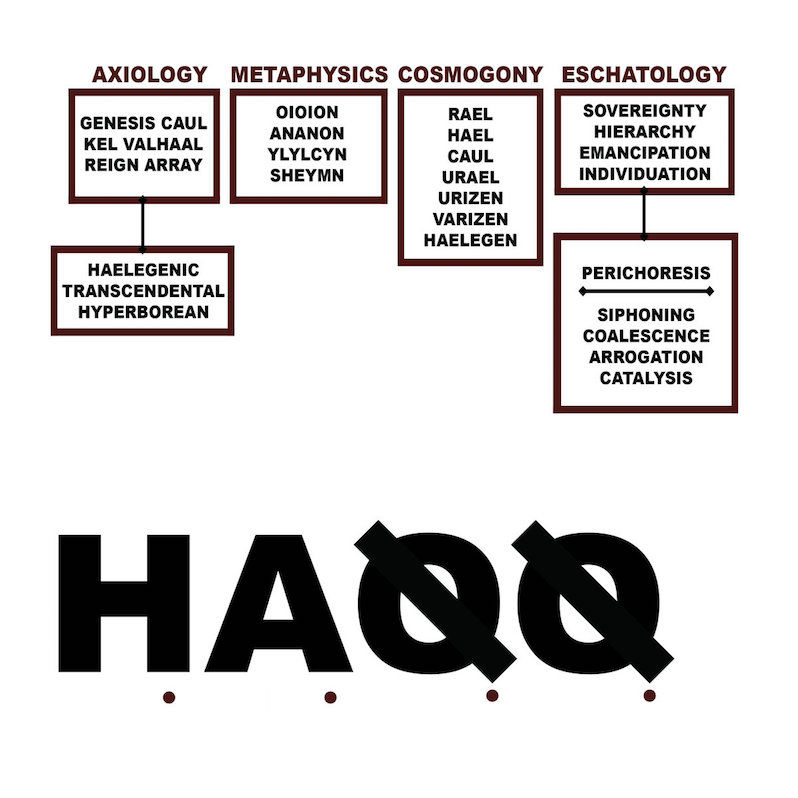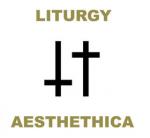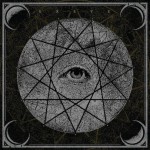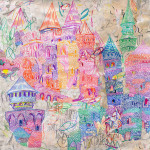Liturgy : HAQQ

It’s easy to be snarky about Liturgy. From frontman Hunter Hunt-Hendrix’s obnoxious manifesto to the tendency for the group to release fucking graphs in support of their music, they lend themselves to a kind of easy dismissal that a lot of other black metal groups don’t. This is saying something; the genre is not exactly unwelcoming to similar blowhards trucking in nonsense gibberish manifestos and Hunt-Hendrix’s parents’ background as self-help authors both explains his odd behaviors and also fits surprisingly well with black metal’s own often darker-tinged approach to self-help. Add to the mix the preposterously bad third album by the group, The Ark Work, which not only fused experimental rock and black metal with the absolute worst of Soundcloud mumble rap but also came replete with truly god awful artwork and a level of pretentious bullshit surrounding its origin and sonic intent that could turn the nose even of those most intent to enjoying the damn thing.
And while it would sound based on that opening that this is about to be a critical panning, that’s in fact not the case. Because, if we are honest with ourselves, outside of that one colossal failed experiment, Liturgy is actually pretty good, if misaligned with themselves. Debut record Renihilation was an intriguing mixture of noise rock and krautrock with surprisingly satisfying jolts of black metal to mix things up, often sounding more like the long-teased Thurston Moore black metal project than Moore wound up delivering either with black metal supergroup Twilight or his metallic free-improvisation noise work with noise/jazz guitarist Keiji Haino. Their followup Aesthethica tightened things up a bit, clarifying the previously more outlandish tendency toward noise into something perhaps more easily comparable to the post-hardcore infused post-black metal of Bosse-de-Nage. Even the record following The Ark Work, Hunter Hunt-Hendrix’s oft-overlooked solo experimental electronic album under the new Kel Valhaal titled New Introductory Lectures on the System of Transcendental Qabala managed to even out the lumpiness of the compositions of that previous less successful record and produce an album that at least seemed to validate the promise of his intentions to fuse industrial house music, rap, and IDM, even if Danny Brown would wind up doing the same idea but better with both The Atrocity Exhibition and its follow-up.
HAQQ seems intent, likewise, on continuing the process of Hunt-Hendrix learning his lessons. Foremost is the departure of long-term drummer Greg Fox and bassist Tyler Dusenbury, leaving only founding guitarist Bernard Gann alongside Hunt-Hendrix from the early days, clarifying what we have all always known—that this group was always a solo project. The emboldening of this clarifying gesture seemed to free Hunt-Hendrix to reformulate The Ark Work by taking the fix-up on his Kel Valhaal record and reintroducing those ideas to his previous Renihilation/Aesthethica-era approach to experimental rock. The tendency toward black metal is increased but the reliance on major key timbres and electronic textures seems to gesture more towards orchestral music played with rock instruments, almost a parallel and more intense post-rock than proper extreme metal. On paper, this might sound like an overlong description of post-metal, but comparing HAQQ to the blackened post-metal of groups like Minsk presents them as totally different animals. Liturgy here is more Reichian, drawing on minimalist composers and their work both for strings and piano, reinterpreted by a collaboration between Explosions in the Sky and Aphex Twin. This is further accentuated by the interludes which are quite literally minimalist piano pieces, dancing arpeggios on piano, giving that meatiness of the weight of keys that solo piano music needs to feel as vibrant and physical on recording as it does in real life.
There is screaming, sure, and blast beats, and a hell of a lot of tremolo picking, but HAQQ shows a Liturgy more and more comfortable with the realization that the critics were right and they really aren’t black metal and that’s not necessarily a bad thing. We saw similar movements with Deafheaven, a group who admittedly is much closer to black metal but has grown more comfortable over the years explicitly pursuing other sonic ideas without worrying about whether they align with the strictures of the genre while also feeling free to drop absolute blackened rippers like “Black Brick”. Another point of comparison would be Colin Stetson’s group Ex Eye, a group that happened to also contain Greg Fox, and was comfortable pursuing an experimental rock hybrid of krautrock, black metal, doom metal and jazz without getting overly concerned about how proximal it would be to black metal’s center. Indeed, this insight which seems to so strongly permeate the compositions of HAQQ are helpful when approaching Liturgy’s work more generally; they’ve always been a rather inventive krautrock group with electronic influences trapped inside a black metal band’s body.
Guitars sheet like rain, distended and digital, roughed up by the glitched electronic production when it’s not roaring bright and pristine. The drums by and large stick to continuous blasts but have enough variance in their approach to blasts that they give the proceedings a sense of ebb and flow. Vocals are thankfully wholly shrieked, with nary a deadpan bad rap tone to be found, and the shrieks are blended especially well into the sheets of sound. There are, of course, sonic missteps; there is an out-of-tune flute on the opening track, for example, that seems like it’s supposed to evoke the same kinds of roughness and rawness we associate with black metal but, between its mix and the precious way it warbles, instead feels distracting and amateurish in a detracting way. Likewise there is a tendency on the album to give out of place harp glissandos or chanted backing vocals that do not always mix well or are just off enough in their timing to feel like a roommate playing along with the record rather than a proper decision. These are, however, largely able to be looked past, leaving a bright and intriguing experimental rock/metal record in its wake.
Records like this underscore the potential of Liturgy as a project. In terms of complete records, HAQQ is perhaps the group’s best, being both a tightly focused work and well-executed in its aims. It is, of course, less earth-shaking than its frontman would perhaps like, and their sound is less wildly revolutionary or even wholly unique as it is a set of good and complementary ideas. The group does best when they get out of their own and let the music speak for itself, put aside the childish provacateurism surrounding their previous record in which Hunt-Hendrix at one point said was almost deliberate antagonism of the black metal world. The group’s first two albums were solid, more solid than their blowback and attendant artist statements might imply, and while a lot of bridges seem to have been burned in the years since their debut, a record as strong and compelling as HAQQ can do wonders to repair that. HAQQ is not merely a good record for Liturgy but a good record period and any interested in contemporary experimental rock and metal owe themselves a pass through. If the group can keep up to these standards, it’s not hard to imagine their early years of grandiloquent statements and the occasional poorly executed experiment can be looked past. After all, other black metal groups have said and done much, much worse, and it’s not really experimental art if the experiment works every single time.
Similar Albums:
 Liturgy – Aesthethica
Liturgy – Aesthethica
 Ex Eye – Ex Eye
Ex Eye – Ex Eye
 Lightning Bolt – Sonic Citadel
Lightning Bolt – Sonic Citadel
Langdon Hickman is listening to progressive rock and death metal. He currently resides in Virginia with his partner and their two pets.

